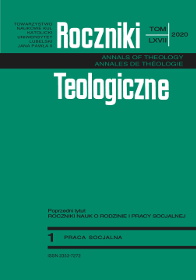H5 Model Concerning Refugee Family Trauma and Recovery and its Application in Social Work Practice – Towards an Improved Refugee Family Assistance. Theoretical and Practical Considerations
Abstract
The authors explore the complexities of human dignity, analyze human dignity as a concept and its position within the framework of today’s social work practices. In this regard, the authors ponder upon diverse understanding of human dignity, including human dignity as a socio-legal value and its importance to social work in general and to other principal values relevant for social work. They examine the evolution of social work approaches towards human dignity while focusing on social work related international organizations and their national members’ and partners’ work to promote and uphold human dignity in delivery processes of social services.
References
Baker, C.N., Brown, S.M., Wilcox, P.D., Overstreet, S., Arora, P. “Development and Psychometric Evaluation of the Attitudes Related to Trauma-Informed Care (Arctic) Scale.” School Mental Health (2016), 8, 1: 61–76.
Brandmeier, M., Kruse, J. “Trauma und Asyl in Flȕchtchlingsrecht in Theorie and Praxis: 5 Jahre Refugee Law Clinic an der Justus-Liebig-Universitȁt Giessen, In P. Tiedemann, J. Gieseking, Flȕchtlingsrecht in Theorie und Praxis. Baden Baden, 2014.
Brown, S.M., Baker, C.N., Wilcox, P. “Risking Connection Trauma Training, A Pathway Toward Trauma-Informed Care in Child Congregate Care Settings.” Psychological Trauma: Theory, Research, Practice (2012), 4, 5: 507–515.
Carlson, E.A., Sroufe, L.A. “Contribution of Attachment Theory to Developmental Psychopathology.” In D. Cichhetti, D.J. Cohen (eds.), Developmental Psychopathology. Vol I. Theory and Methods, 581–617. Oxford, 2014.
Congress, E.P. “The Culturagram.” In A. Roberts, Social Work Desk Reference, 969–973. New York–Oxford, 2008.
Congress, E.P. “The Culturagram.” In K. Corcoran, A.R. Roberts. Social Worker’s Desk Reference. New York, 2015.
Das, M. “Ecological Integrative Body-Mind-Spirit Approaches Within Conflict – Induced Displacement.” In M.Y. Lee, C.H.Y. Chan, C.L.W. Chan, S.M. Ng, P.P.Y. Leung. Integrative Body-Mind-Spirit Social Work An Empirically Based Approach to Assessment and Treatment, 270–279. Oxford–New York, 2018.
Elliott, D.E., Bjelajac, P., Fallot, R.D, Markoff, L.S. “Trauma-Informed or trauma-denied. Principles and Implementation of Trauma Informed Services for Women.” Journal of Community Psychology (2005), 33, 4: 461–477.
Fallot, R.D., Harris, M. “Creating Cultures of Trauma-Informed Care (CCTIC), A Self-Assessment and Planning Protocol.” Community Connections, April 2009, 1–19.
Hilado, A., Lundy, M. Models for Practice with Refugees and Immigrants, Collaboration, Cultural Awareness and Integrative Theory. Los Angelos–London, 2018.
Jackson, K. “Treating Trauma in American Refugees.” Social Work Today (2016), 16, 4: 10.
Jovev, M., Jackson, H.J. “Early Maladaptive Schemas in Personality Disordered Individuals.” Journal of Personality Disorders (2004), 18, 5: 467–486.
Levenson, J.S. “Trauma- Informed Social Work Practice.” Social Work (2017), 62, 2: 1–9.
Miller, W.R., Rollnick, S. “Ten Things that Motivational Interviewing is not.” Behavioural and Cognitive Psychotherapy (2009), 37, 2: 129–140.
Miller, W.R., Yahne, C.E., Moyers, T.B., Martinez, J., Pirritano, M. “A randomized trial of methods to help clinicians learn motivational interviewing.” Journal of Consulting and Clinical Psychology (2004), 72: 1050–1062.
Mollica, R.F. The new H5 model, Trauma and Recovery. Harvard, 2014.
Mollica, R.F., Brooks, D.R., Ekblad, S., McDonald L. “The H5 New Model of Refugee Trauma and Recovery.” In J. Lindert, I. Levav (eds.). Violence and Mental Health, Its Manifold Faces, 341–378. New York–London, 2015.
Mollica, R.F., Bollini, P., Caspi, Y., Truong, T. “Harvard Trauma Questionnaire; Validating a Cross-Cultural Instrument for Measuring torture, Trauma, and Posttraumatic Stress Disorder in Refugees.” Journal of Nervous & Mental Disease (1994), 180, 2: 107–111.
Pathways to Wellness. Refugee Health Screener 15 (RHS 15). Washington, 2011.
Potocky, M., Guskovict, K.L. “Enhancing Empathy among Humanitarian Workers through Project Miracle: Development and Initial Validation of the Helpful Responses to Refugee Questionnaire.” Torture (2016), 26, 3: 46–59.
Schauer, M., Neuer, F., Elbert, T. Narrative Exposure Therapy: A Short Term Treatment for Traumatic Stress Disorders. Cambridge, 2002.
Sudbury, J. “Key features of therapeutic social work: The use of relationship.” Journal of Social Work Practice (2002), 16, 2: 142–162.
Teyber, E., McClure, F. Interpersonal processes in therapy. An Integrative Model. Belmont, 2011.
Copyright (c) 2020 Roczniki Teologiczne

This work is licensed under a Creative Commons Attribution-NonCommercial-NoDerivatives 4.0 International License.





